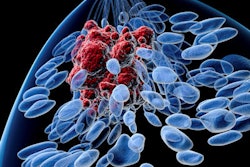
Imaging services provider RadNet has acquired Dutch artificial intelligence (AI) software developers Aidence and Quantib in deals that the company hopes will enable wide-scale screening programs for lung and prostate cancer.
RadNet's AI division has previously focused on breast imaging AI software, but the purchases of Quantib and Aidence will provide access to prostate, brain, and lung AI applications. A spin-off of Erasmus Medical Center, Rotterdam-based Quantib develops AI software for prostate and brain MRI. Meanwhile, Aidence has focused on utilizing AI for lung nodule management and lung cancer screening.
The goal is to apply these algorithms to facilitate new cancer screening programs for prostate and lung cancer, according to RadNet.
"With the addition of Aidence and Quantib, we will now have effective screening solutions for the three most prevalent cancers," said RadNet chairman and CEO Dr. Howard Berger in a statement. "We believe that large population health screening will play an important role for health insurers, health systems and large employer groups in the near future. As the largest owner of diagnostic imaging centers in the United States, RadNet has relationships that can serve to make large-scale screening programs, similar to what mammography is for breast cancer screening, a reality."
Prostate MRI
Quantib's Prostate AI software for analysis of multiparametric MRI exams and ND software for brain MRI have both received U.S. Food and Drug Administration (FDA) 510(k) clearance and the CE Mark. All Quantib algorithms are available via the vendor's AI Node platform. The firm has customers in 20 countries, according to RadNet.
The opportunity to create a lower-cost and more accurate prostate MRI service for Medicare and private payers allows for a conversation about creating large-scale prostate-cancer screening programs for qualified male patient populations, similar to how mammography is utilized today, Berger said. He also noted that Quantib's brain MRI algorithms will be important tools for RadNet and could aid in monitoring patients with Alzheimer's disease.
Quantib's management team -- CEO Arthur Post Uiterweer, Chief Technology Officer Jorrit Glastra, and Chief Operating Officer Quirine van Voorst -- will remain with the company.
Lung cancer
Meanwhile, Aidence has commercialized Veye Lung Nodules software for AI-based lung nodule detection and management. It's received the CE Mark and is currently pending FDA clearance. The software has been implemented in seven European countries and is currently used to analyze thousands of CT scans each week, according to RadNet.
Aidence co-founder and CEO Mark-Jan Harte and Chief Business Officer Jeroen van Duffelen will also be staying on with the firm.
For RadNet, the acquisitions continue its recent aggressive initiative to develop and utilize AI. The firm launched an AI division in 2019 following its acquisition of radiology AI startup Nulogix and breast imaging AI software developer DeepHealth in March 2020.
In addition, RadNet collaborates with Hologic on developing breast health AI software and has a breast imaging partnership with WhiteRabbit for its WRDensity breast density analysis software. The company has also been active in researching the use of deep-learning algorithms for improving MR image reconstruction.
AI market consolidation
RadNet's acquisitions of Quantib and Aidence reflect a strong trend toward the need to establish one platform for AI, informatics expert Dr. Erik Ranschaert, PhD, told AuntMinnie.com.
"Also, U.S. companies appear to have a keen interest in buying European AI developers at the moment," said Ranschaert, a radiologist from St. Nikolaus Hospital in Eupen, Belgium, and a visiting professor at Ghent University.
Ranschaert also speculated that the medical imaging AI bubble might be about to burst.
The acquisitions highlight the growing interest in deploying AI in outpatient imaging centers, enabling RadNet to differentiate itself from its competitors, according to Signify Research UK Senior Analyst Sanjay Parekh, PhD.
"Expanding its AI portfolio also highlights the need to further drive improvements in workflow efficiencies, especially for time-consuming exams such as breast imaging, prostate MRI, and lung cancer diagnosis, increasing the appeal of radiology departments in hospitals to outsource such exams," Parekh told AuntMinnie.com. "While still early in the adoption curve of AI in radiology, RadNet's vote of confidence in AI will have substantive impact, both in terms of spurring market momentum and sparking more consolidation in the AI marketplace."



















